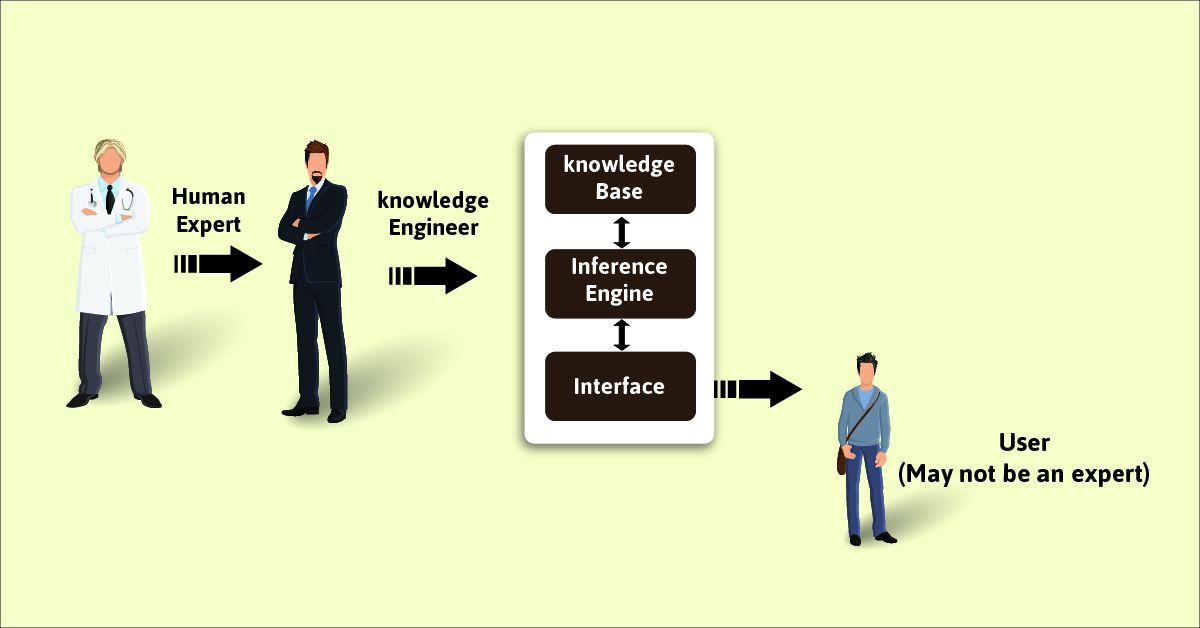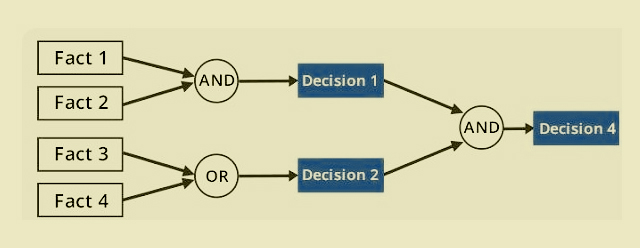Free Machine Learning courses with 130+ real-time projects Start Now!!
In this Expert System Tutorial, we will learn what is Expert System in Artificial Intelligence. Also, will learn the components, characteristics and types of AI Expert System.
Along with this, will study Expert System benefits and disadvantages of AI. Besides, all will use images to represent it in a better way and for better understanding.
So, let’s start exploring Expert System in Artificial Intelligence.
What is the Expert System in Artificial Intelligence?
We can say, the Expert System in AI are computer applications. Also, with the help of this development, we can solve complex problems. It has level of human intelligence and expertise.
a. Characteristics of Expert System in AI
b. Capabilities of Expert System in AI
The expert systems are capable of −
- Instructing and assisting a human in decision making
- Justifying the conclusion
Suggesting alternative options to a problem. They are incapable of −
- Substituting human decision makers
- Possessing human capabilities
- Producing accurate output for inadequate knowledge base
- Refining their own knowledge
Components of Expert System in Artificial Intelligence
The components of AI expert system include −
Let us see them one by one briefly −

Components of Expert System in Artificial Intelligence
Knowledge-Based in Expert System
Generally, it contains domain-specific and high-quality knowledge. Also, as to exhibit intelligence required Knowledge. Although, a collection of highly accurate and precise knowledge is the reason for the success of Expert System in Artificial Intelligence.
a. What is Knowledge?
Basically, data is a collection of facts. Also, have to organize the information as data and facts about the task domain. Further, we can define knowledge as the combinations of Data, information, and past experience.
b. Components of Knowledge Base
Basically, there are two components present:
- Factual Knowledge – Generally, knowledge Engineers and Scholar used this in the task domain.
- Heuristic Knowledge – Generally, we can say it’s all about practice, accurate judgment and one’s ability of evaluation.
c. Knowledge Representation
Basically, it’s types of method. We use this to organize and formalize knowledge in a knowledge base. Although, this method is in the form of IF-THEN-ELSE rules.
d. Knowledge Acquisition
Basically, quality and accuracy are the key reasons for the success of an expert system in AI.
Also, knowledge engineer acquires exact information. Although, as they collect this information from a subject expert. He has had various ways to collect the information in different ways. Such as by recording, interviewing, and observing him at work, etc.
He uses IF-THEN-ELSE rules, to organize and categorize information in a meaningful way. The knowledge engineer also monitors the development of the Expert System.
Inference Engine
To arrive a particular solution, Inference Engine acquires and manipulates the knowledge.
In case of rule-based Expert System in Artificial Intelligence −
- We have to apply rules to the facts. That is obtained from earlier rule application.
- Also, we have to add new knowledge if it’s required.
- Basically, it can resolve rules conflict. Whenever multiple rules are applicable to a particular case.
To recommend a solution, the Inference Engine uses the following strategies −
a. Forward Chaining
We can say that it’s a type of strategy of an expert system. In this, we have to answers this question, “What can happen next?”
Generally, it follows the chain of conditions and derivations. Also, reduces the outcome. Although, it needs to consider all the facts and rules. Further, have to sort them before concluding to a solution. Moreover, this is followed by working on a result.
Prediction of share market status as an effect of changes in interest rates.

Forward Chaining
b. Backward Chaining
As with the use of this strategy, an expert system finds out the answer to the question, “Why this happened?”
Basically, as what has already happened matter a lot. Thus, it tries to find out which conditions could have happened in the past for this result. Hence, this strategy is followed by finding out cause or reason.
For example:
Diagnosis of blood cancer in humans.

Knowledge Base in Expert Systems – Backward Chaining
User Interface
Generally, Expert System in AI users and ES itself uses User interface as a medium of interaction between users. Also, the user of the Expert Systems need not be
necessarily an expert in
Artificial Intelligence.
Although, at a particular recommendation, it explains how the Expert Systm has arrived. Hence, the explanation may appear in the following forms −
- Basically, the natural language displayed on a screen.
- Also, verbal narrations in natural language.
Further, listing of rule numbers displayed on the screen. The user interface makes it easy to trace the credibility of the deductions.
Disadvantages of Expert Systems in AI
Basically, we have noticed that no technology can offer an easy and complete solution. Also, large systems are too costly. Although, they require significant development time and computer resources.
Also, AI Expert Systems have their limitations which include −
- Limitations of the technology
- Difficult knowledge acquisition
- Expert Systems are difficult to maintain
Expert System Technology
Technologies used in Expert Systems in Artificial Intelligence includes:
a. Expert Systems Development Environment
Basically, hardware and tools are included in it. They are −
- Minicomputers, workstations, mainframes.
- LISt Programming (LISP) and PROgrammation en LOGique (PROLOG).
b. Tools
Generally, tools are used to reduce the effort and cost.
- Powerful editors and debugging tools with multi-windows.
- They provide rapid prototyping.
- Have Inbuilt definitions of a model, knowledge representation, and inference design.
Benefits of Expert Systems in Artificial Intelligence
a. Availability
Due to mass production of software, expert systems are easily available.
b. Less Production Cost
As the production cost of an expert system is reasonable. Thus, it makes them affordable.
c. Speed
Expert systems offer great speed. Also, reduce the amount of work that an individual puts in.
d. Less Error Rate
Generally, an error rate of the expert system is low in comparison to human errors.
e. Reduced danger
They can be used in any risky environments where humans cannot work with.
f. Permanence
The knowledge will last long indefinitely.
g. Multiple expertise
It can be designed to have knowledge of many experts.
They are capable of explaining in detail the reasoning that led to a conclusion.
AI Expert System with Applications
We use expert systems in designing of camera lens and automobile.
In this data is compared with an observed system
c. Process Control Systems
We have to control physical process based on monitoring
Finding out faults in vehicles, computers
Expert system is used to detect possible fraud.
So, this was all about Expert System in Artificial Intelligence. Hope you like our explanation.
Conclusion
As a result, we have studied Expert Systems in artificial intelligence. Also, learned characteristics, components, types and benefits along with expert systems applications of AI.
As we have images that will help you in better understanding. Furthermore, if you feel any query, feel free to ask in a comment section.
Your opinion matters
Please write your valuable feedback about DataFlair on Google




